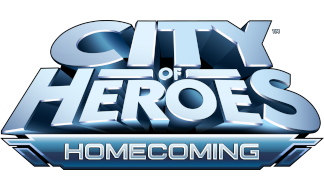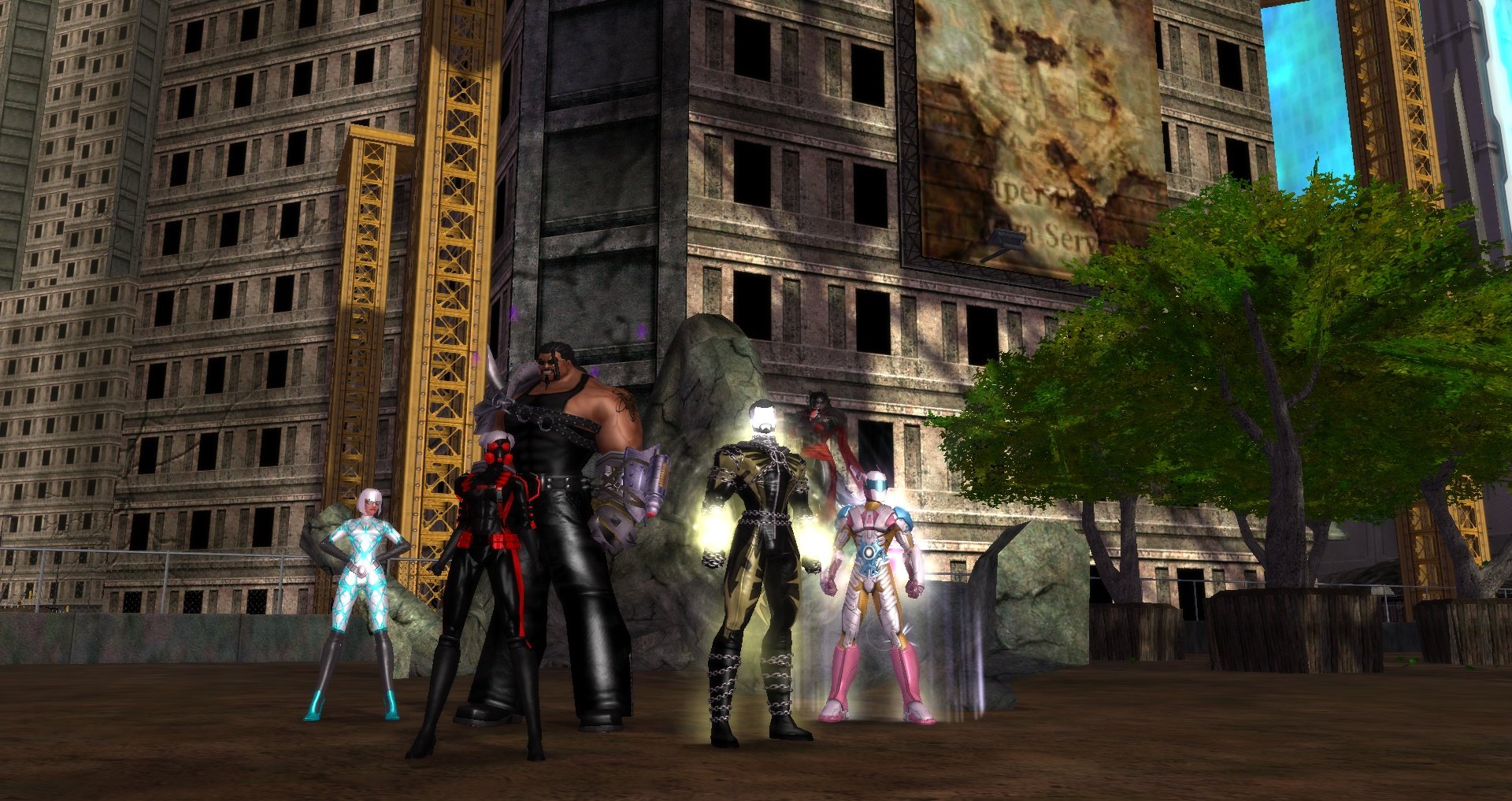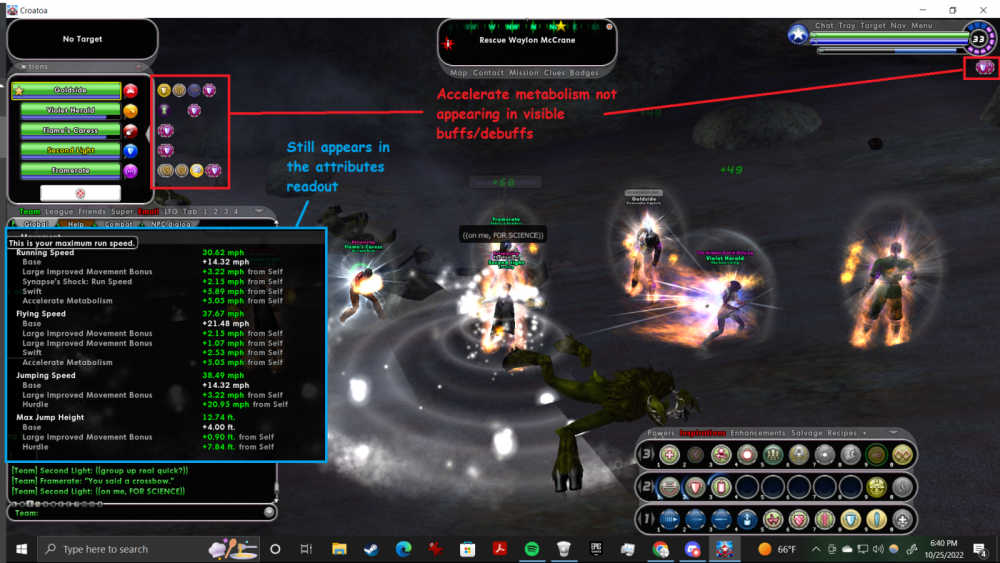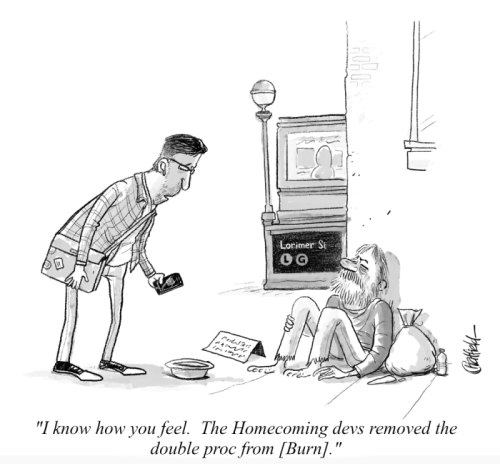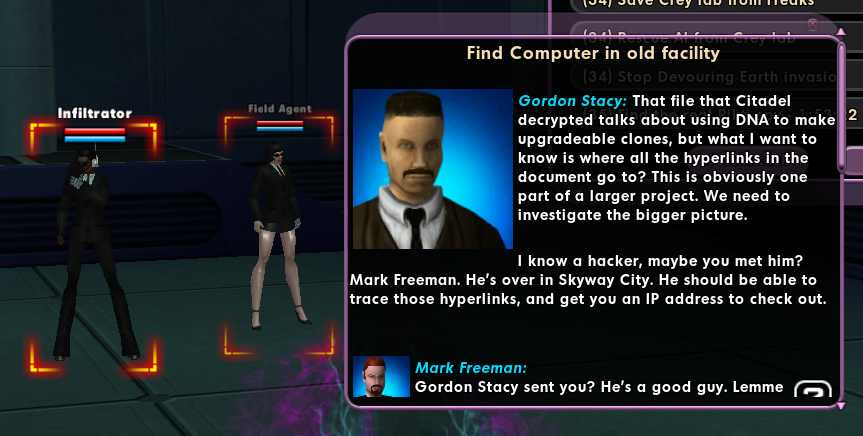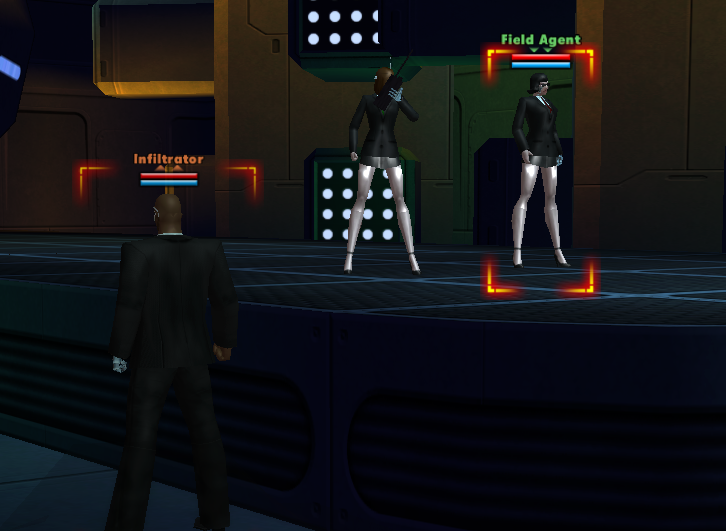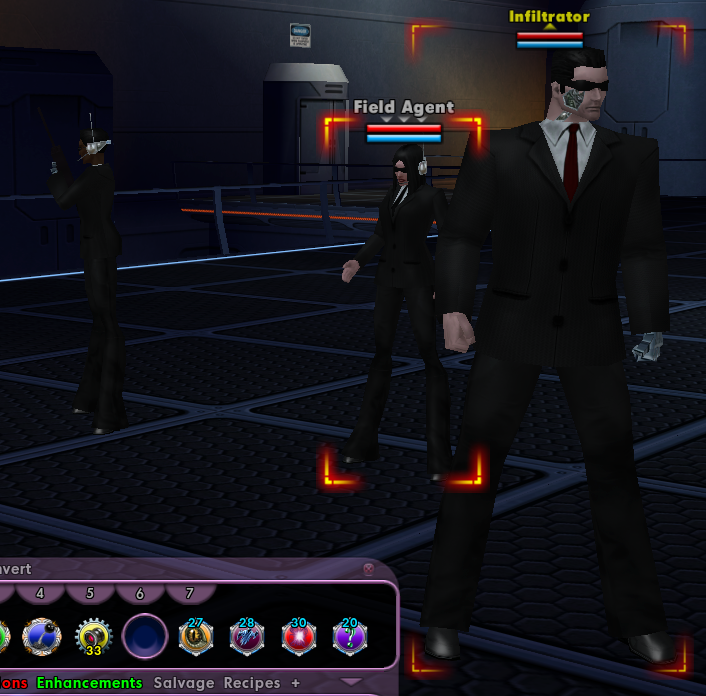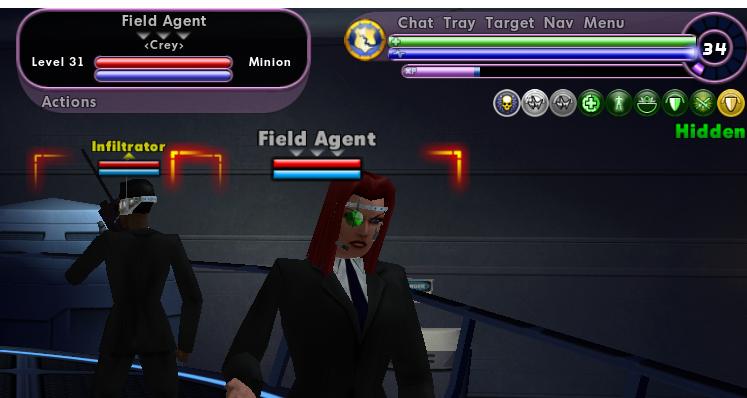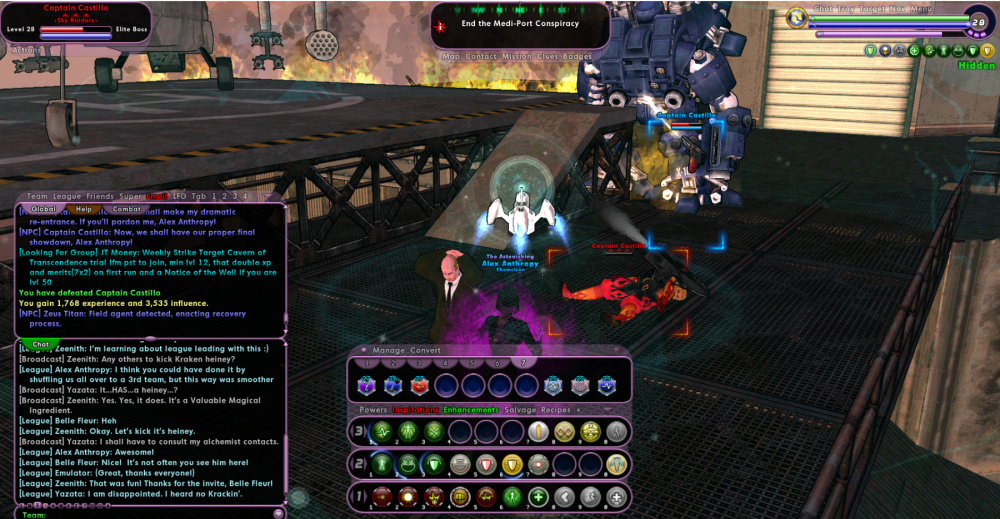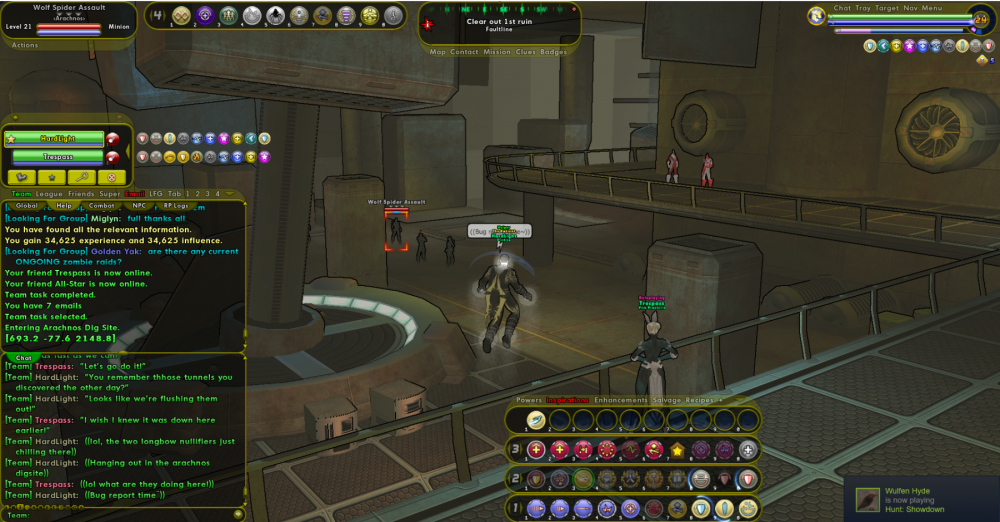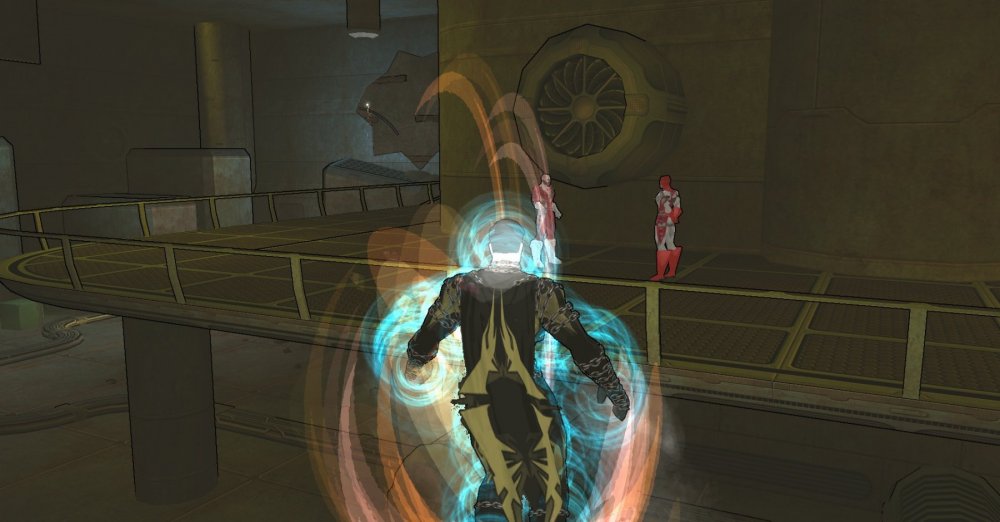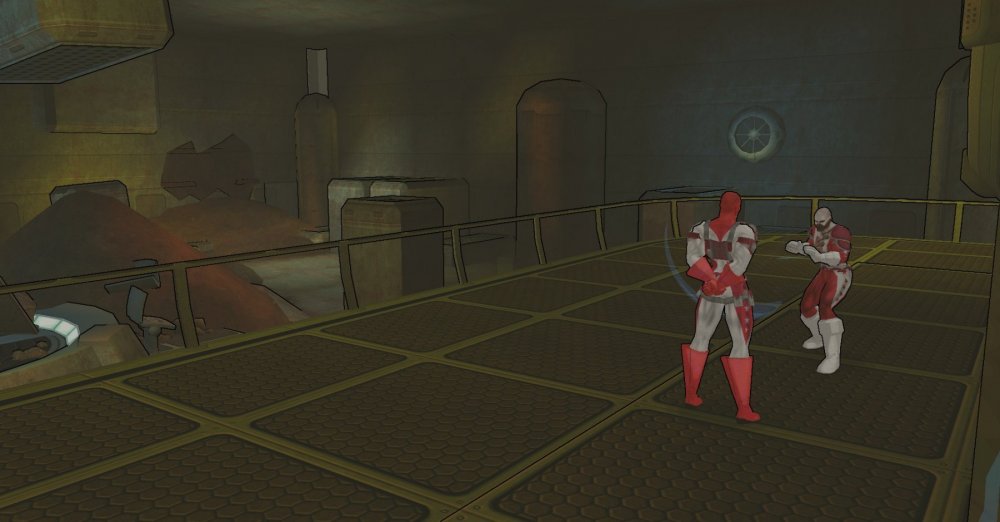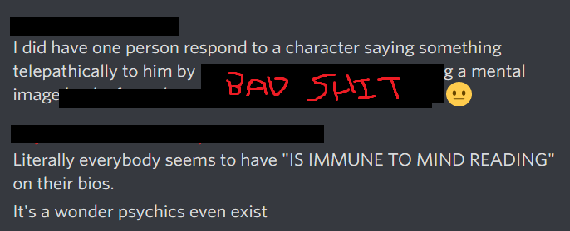-
Posts
104 -
Joined
-
Last visited
-
Days Won
1
Content Type
Profiles
Forums
Events
Store
Articles
Patch Notes
Everything posted by TwoDee
-
I gradually came to this same conclusion over my time with City of Heroes roleplay. Shakespeare said that "brevity is the soul of wit," and nothing gives you a better sense of the fundamental core hooks of a character than trying to compress their entire appeal into a mere 1,000 characters. A character with twenty gimmicks is never going to be as interesting as a character with two very well-executed gimmicks. A dirty little secret of not just City of Heroes roleplay but all online roleplay is that people generally aren't in it to care about or read bios. Sure, I like a well-written bio, but that's a tangential side-appeal to the actual main appeal of engaging in active roleplay with an interesting character written by another player. The less wieldy a bio gets, the less likely it serves the purpose it's intended for as a facilitator and entrypoint for roleplay. If other players already know everything about your character, why interact with them?
-
To qualify my own prior statements about "the heroes should always win," since it's clear the principle ruffles feathers: it's not my opinion that your roleplay is Bad, Wrong, and Invalid if you're running some storyline and want the Council to massacre the King's Row PPD precinct, or Miss Libby to get tortured, or whatever (if I had a nickel for every VG I was a part of that had a roleplay that was explicitly about capturing and torturing a canon NPC, I'd be able to cash it in for 15 minutes on a parking meter). If antagonists don't get their wins in, then there are no stakes to a storyline in the first place. However, what I do hold "the heroes should always win" to be is a statement of best-practices "in the wild," when there have been no session zeroes and no discussions of consent. If I initiate a conflict between my villain and a hero without a robust OOC discussion of intents, I play the heel and then "do the job," because the expectation of shared RP spaces like Pocket D necessitates a return to the equilibrium. As @Redletter alludes to, things start to sour real quickly if you roll up into a space with superhero players (who vastly outnumber villain players) like "damn, it felt so good to eat the still-living organs of that screaming Longbow Sergeant, now it's time for cocktails:" it's telegraphing a threshold of villainy that beggars immediate and active response from heroes, and especially when there's no always-on PvP and so adjudication of conflicts has to fall onto roleplay, it sucks if a villain player drops something like that and then doesn't budge on "no, if we fight my guy wins because he's like, WICKED powerful." That doesn't mean that the same can't happen in the inverse -- a hero player rolling up on a group of villains and going, I don't know, "Longbow is great! I just beat up eleven jillion Arachnos!" -- but even that isn't really equivocal, just because antagonists are active and protagonists are reactive; it doesn't break the fiction of the shared space for the villain to just shrug that off and go "yeah sure buddy, I killed eleven jillion Arachnos before lunch, I'm a villain" or "Why do I care about Arachnos? I'm literally a black dragon," the way that it does for a hero to be nonreactive to a villain doing something appalling in their presence. Anyway, this is a lot of words to reiterate that I don't think you're wrong for wanting the redsiders to notch a few Ws. My policy is for interacting with the roleplaying public when outside of curated spaces that are more towards personal sensibilities. It's not "fair," but it's a good fallback when the alternative is either a robust Session 0 before each roleplay. or a flaming blowout where everyone blocks each other and starts insinuating about godmoders or edgelords on the forums. Think of it like wrestling: people love heels because they provide menace for the baby faces, but at the end of the day regardless of who wins the heel should be working with the face to create an interesting narrative arc, rather than fighting to win for the sake of the villains notching a W alone.
-
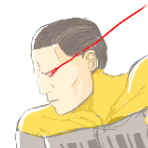
Defender [Accelerate Metabolism] not appearing in visible buffs
TwoDee posted a topic in Bug Reports
A cosmetic issue, but a gnarly one: whenever my Defender, Second Light, uses [Accelerate Metabolism], it doesn't visualize on my or any other player's buff icon bar. Mechanically, the buff lands, but nobody sees it and we can't track uptime.- 1 reply
-
- 1
-

-
Starting page 6, we'll be instituting a formal program of exporting three-quarters of the roleplay spoilsports from Everlasting who lecture you about how "actually, there's no such thing as a fully nonlethal weapon so you're totally a murderer." This way, all four shards can achieve equity, with every AR/, DP/, Katana/, Broadsword/, War Mace/, and Fire/ user on Homecoming receiving equal treatment of buzzkill parade-raining.
-
I was dancing around responding to this thread, because metadiscussion of MMORPG roleplay drama can itself be drama. I love playing peanut gallery, but it's hard to resist the urge to just wade in and start throwing bigger projectiles than peanuts when confronted with some of the most awkward, most deviant, and most cruel behavior that roleplayers can visit upon other roleplayers. So, I committed to not responding until I felt that I had a point that I could make. In my hubris, I think that I've found that point in an appeal to scope and perspective. To build off the points above -- and I recommend that folks go up and read them if they haven't, as I was just quoting the most immediately applicable passages! -- when I experience the sorts of teapot tempests that MMORPG roleplay communities inculcate, I often feel that MMORPG roleplayers suffer a lot from the Narcissism of Minor Differences. Let's get the elephant out of the room: the Narcissism of Minor Differences is a Freudian psychoanalytic concept. Freud was, in many aspects of his work, a hack and a fraud and terribly off-base, and this observation is not meant to go pop-psychology and diagnose roleplayers as pathological narcissists, nor to attempt to use roleplayers as a tool to "prove [Freud] right." However, I think that when one familiarizes oneself with the broad strokes of the concept, a lot of social conflicts both macro and especially micro, as in roleplay feuds, make a lot of sense. The pithiest summary is that most humans desire to be perceived as a unique and thinking individual that is more than just the mechanical sum of overlapping categories on a balance sheet. Thus, we are psychologically incentivized to make qualitative differentiations between ourselves and others, because being able to point to someone else and go "I am not that" is an easy way to define the self. In the time since Freud coined the term (to examine how the most bitter wars have historically occurred between cultures and nations that appear very similar to outsiders), the Narcissism of Minor Differences has become an ever-keener aspect of daily life. Globalism streamlines us into an interconnected monoculture with shared media, consumer goods, and economic outcomes. As differences between individuals become smaller and smaller, the need to define ourselves as unique and unlike everyone else continues to burn ever stronger for it, and the differences that are required to create that definition become increasingly granular. Thus, the political phenomenon referred to bitterly as "The Left Eats its Own." Thus, gender-coded shaving razors and shampoo, because you wouldn't want your curly hair to be mistaken for curly girl hair. Thus, Playstation and XBox fans bitterly warring over whose expensive DVD player hits 60FPS. Trekkies and Star Wars, Call of Duty and Battlefield, DC and Marvel, Leo and Gemini. A million little festering tiny resentments based around the fundamental human envy of "I know who I am, because I'm not them," coopted by interests that can provide material signifiers to prove our uniqueness. Not to put too fine a point on it, but MMORPG Roleplayers, categorically, have inscrutably minor who-gives-a-shit differences that are about five steps removed from any distinction that a sane outsider could possibly make by observation: 'Gamers' Video Gamers (this is where your parents stop caring) PC Video Gamers (this is where most people stop caring) PC Role-Playing Game Players (this is where other gamers stop caring) Massively Multiplayer Online Role-Playing Game Players (this is where anyone with anything else going for them stops caring) City of Heroes Players People Who Pretend To Be Their Character For Fun Those Other, Bad Roleplayers Who Roleplay Wrong And Aren't Like Me Because I'm Different (you are here) That is the level of scope we're fighting over. That is the small town that @McSpazz described as the "small town effect." 700 players at peak hours, charitably a third of whom are roleplayers, and you bet your ass that I'm being charitable. Even @Shadeknight's City of Roleplay Discord, which ended up as the most populous Discord for dedicated City of Heroes roleplayers by dint of being first past the post, has 1,600 members total from the entire history of Everlasting's existence, and only 30 of them are active enough to have posted in the roleplay channel in the last month (#general-chat, for discussing anything and everything, had 48). If every topic in the Homecoming Roleplaying Forum were posted by a totally unique individual, and they sure as hell aren't, we'd still be smaller than half the size of Block Island, a Rhode Island town that looks like this: We're not even a "small town;" we're not that impressive! What we are is a middling-sized air force base, or one of those technical incorporated townships that exists only to provide a gas station on a long stretch of highway. Or, to make for a salient comparison that ties us back into the original point, we're the size of a middle school. Middle school is a terribly awkward time, and I suspect that a not-insubstantial plurality of the people in this forum remember keenly what it was like to be an ostracized teenage nerd before "nerdiness" was cool (which is yet another thing that so many of us have in common). At no period in our lives do we feel more keenly the need to separate, to carve out our own identity, than when we barely qualify as a sapient life form and are suddenly lumped into a system of behavioral streamlining with all of the other socially maladroit tweens. That's what creates middle and high schools' legendary cliquishness and exclusion. Roleplaying, too, is a terribly awkward community and a terribly awkward pastime -- informed by the insufficiency of text-based communication -- and so too do we, in our transcendental awkwardness, feel that drive to set ourselves above and apart from the other roleplayers, to make a qualitative differentiation that separates this subcategory of a subcategory of a subcategory of a subcategory of a subcategory of a subcategory of video gamers into the 👿bad👿 camp and the 👼good👼 camp, the latter of which we all belong to (obviously). Lest it sound like I'm placing myself into some kind of untouchable patrician overseer role by making these observations, I'm going to dime on myself, here: I talk shit about other roleplayers. I talk mad shit. I feel hurt or invalidated by an interaction, and then I flee to my echo chamber of like-minded friends to bitch and moan about how the other participant wouldn't let me get a word in edgewise. I repost anonymized screenshots of ERP characters that I think are tasteless or obscene, to elicit "oh no!" reacts and gauge whether my own reaction was overzealous or appropriate from the social validation I receive. I laugh when roleplayers who gave me a bad time once get caught in byzantine e-relationship blowups that eviscerate entire guilds with their parasocial shrapnel. And I suspect that I'm going to get a lot of "golly, I could never!" responses to that disclosure, but I would ask in turn that who among us hasn't suffered through an interaction with an awkward creeper, or a pushy stranger at the checkout, or a bad boss, and then bitched to a spouse or friend rather than escalating it into a conflict? Radical acceptance and love for everyone's idiosyncrasies at their face value is aspirational, but it's also a good way to build a house from broken stairs. So, okay, with that grim recognition out of the way, what's actionable? What can we do to mitigate the fallout from Drama, the inescapable Original Sin on the tiny, myopic planetoid that is MMORPG roleplay? Personally, I think that it's just about setting reasonable expectations about what's a 'name-and-shame' or brigading offense that really, truly necessitates touching the poop, versus just thinking that somebody's kind of a jerk or Has a Wrong Opinion. Have the presence of mind to look upon yourself from an outsider's lens, and ask "would I look like a completely unhinged fucknut pulling out my knives and escalating to total war over an incorrect interpretation of the fictitious lore of Praetoria, an alternate-history AU setting from a video game that died a decade ago?" (yes) I personally try to remain fundamentally decent - if imperious, pretentious, and pedantic - to other players in public spaces like this one, because that sets a tone for baseline civility that most people will honor, and the rest of the drama can all be isolated and transitory. I have a bad time, I whine and scream, I get back on the horse, and maybe next time I can have a good time. At least in the end, most roleplay is typically fun, or we wouldn't all be here.
-
BROKEN The flyers beneath the decorative sugar-skull mural read “GOTHABILLY NITE.” Behind the text, printed in cheap ink that was already starting to fade, the multicolored craft paper boasted the image of a voluptuous model in gothic alt-fashion, a ten-gallon hat crudely photoshopped onto her head. Skyway’s Ocultista bar, nestled gloomily beneath a looming overpass, blared thrumming baselines and twangy string chords from somewhere beneath the foundation. Gothabilly Nite had complicated an already schizophrenic crowd: cybergoth slapped over latin streetwear, too-tight black tees and jeans with elaborate punk-modded jackets. There were periodic glimpses of the nominal theme - a pompadour here, a pair of wranglers there, a polka-dot dress hastily cut into a miniskirt for clubwear appeal - but most of the line was cultural and aesthetic anarchy. Billi B was keenly aware of the sum of her life’s decisions as she was bombarded by muffled banjos and insipid conversation. Escape was a distant prospect even for someone with her towering mass, sandwiched as she was between a twiggy throuple with matching eyeliner and a man who resembled nothing so much as the unholy spawn of old, washed-up Elvis and old, washed-up Bela Lugosi. Billi fit in as much as anyone here did, with her denim jacket and leather trousers showcasing her stocky physique. She wasn’t dressed for partying, but for her kind of business, serving as supermuscle for a deal happening inside the club. She eyed the front of the line and caught sight of a pair of yuppies in cowboy boots getting carded by the bouncer; an ogre whose face smoldered with spikes of burning stone. She dimly recognized him as a former cape-turned-Outcast named Mantlepiece: he was wearing a suit and gloves made from some kind of tacky metallic fabric that was probably fireproof. These kinds of establishments liked to have metas on payroll; it set them apart from other dives, gave them some personality, and served as a deterrent to the local bangers. It was a common sideline for a lot of Outcasts and ex-Outcasts trying on the straight-and-narrow. Billi groaned aloud, setting her square jaw and recommitting herself to going through with the gig. She’d already been through that phase of her life, or really all three: the cape part, then the Outcast part, then the ex-Outcast part. She’d been sixteen when she first discovered that the interaction between serotonin depletion and trait empathy that generates feelings of shame in ordinary people also made her stronger, smarter, and tougher. The stigma of running away from home to seek her fortune in Paragon as a young Mutant had allowed her to support a burgeoning rookie-superheroine career for months. When she got comfortable and her powers had started to wane, a rebrand from “Bad Girl” to the more vulgar “Billi Badass” had sufficed as a holdfast, though she wasn’t able to maintain equilibrium until that scanty little costume she’d hated and a questionable further rebrand into “Bad Bitch.” When she’d gotten inured to those indignities, a streak of high-profile losses had kept her in the lower brackets of the caping world, always maintaining just enough embarrassment at her own failure to avoid becoming entirely unpowered. That lasted until an old rival from the Outcasts looped her in on an armored car job, and her cut of $2 million cash and more shame than she’d ever felt in her life had rocketed her into prime-time high-power supervillainy, then as “Billi Beartrap.” These days, after two Zig tours, several ill-conceived relationships, and a boat-load of therapy, she contented herself with the grey market of powered-muscle work. The pay rate was good for the low risk of just standing there looking intimidating, and the smoldering disappointment of knowing that she used to be a ‘proper’ cape was generally enough to chuck goons around and shrug off small-caliber fire when things went bad. “Wilhelmina Byczek. You gonna start trouble in there, Billi B?” Billi pulled herself out of her spiral to return the fiery gaze of the bouncer, her muscles cording with fresh puissance pulled from the bad memories. She affected dismissiveness, keeping her expression comfortably in the “resting bitch face” spectrum. “Just looking out for a girlfriend who’s already inside, Mantlepiece. I’m out of the life, just like you.” “Uh huh.” Little shards of crystal obsidian, protruding uncomfortably from Mantlepiece’s brow ridge, clinked together as the other ex-Outcast squinted at the ID. After a few more moments of scrutiny, he turned it over, holding it gingerly between two Nomex-clad fingers. “You’re lucky that places like this run a single-lady deficit, Billi. Far as I’m concerned, your history throws up more red flags than a Hellion wearing a sports jersey with a bulge at the hip. But quotas are quotas. Behave yourself.” “Thanks, Duane,” Billi growled, using his real name out of petty spite and earning a carbon-chrome middle finger for her troubles. She stomped down into the wall of noise and brickwork, coasting at a good power level, now: strong, durable, alert. Pity that it had taken getting judged by another ex-Outcast to achieve it. The faux-speakeasy interior was nearly as deranged as the crowd outside. Mantlepiece’s careful cultivation of the line could only salvage so much of the theme night’s dress code, but at least the goths that clustered around a too-small bar had made some small, grudging concession to hoop skirts and updos. Isaac Rother and the Phantoms blared over the speakers as Dracula’s Own Trailer Trash set up the power cables for what would doubtless become a live act closer to the Witching Hour. Halloween-store cobwebs and anatomically-dubious rubber beasties hung from exposed ductwork in the ceiling. Billi found her girl in a maroon VIP booth just past the stage, sipping at a brackish cocktail with a film of blood-red grenadine at the top. Rachel McKidd - or more accurately, Doctor McKidd, PhD - had come up in Paragon around the same time as Billi arrived, when she was interning at a pharmaceutical start-up called Bioxcel. They’d hit it off as friends and then roommates, and grown apart as they lapsed into their respective shady doings; Billi into supervillainy, Rachel into mad science, a common pitfall of the aspiring chemist in the City of Heroes. Billi vaguely recalled something from the newspapers… a scandal? “Long time no see, Rache,” Billi grunted, sidling into the booth across from her contact. “How’s Bioxcel?” “Doctor Oxward turned out to be an unregistered clone coded with genetic memories that made him steal research from Crey,” Rachel shrugged, amicably, her glossy black lips still maintaining contact with her cocktail. “The lawsuits are still ongoing, and SERAPH is having a hell of a time figuring out if Oxward qualifies as a sapient actor for the purposes of his rights.” Billi cringed. Yep, that was the headline. She changed the subject. “What the hell is that you’re drinking?” “They call it a ‘Grim Ripper,’” the doctor deadpanned, swirling it in the space between them and causing the red splash to shift. “Kahlua and I want to say vinegar. It’s a little sweet for my liking.” Rachel had aged about as gracefully as a mad scientist could be expected to in the years since they’d last caught up. She had the characteristic shock of frizzy white hair that every PhD seemed to spontaneously develop when they delved into the dark side of superscience, but a white blouse and black corset had turned that into an elegant Bride of Frankenstein riff, appropriate for the season. She asked, daintily gesturing forward with the glass, “Want some?” “Eugh, no. I don’t do sweet cocktails,” Billi insisted, holding two callused hands up to ward herself from the witches’-brew on offer. “So, what, do you think Bioxcel is going under? Trying to build up a nest egg?” “Bioxcel’s gonna be fine,” Rachel drawled, with a roll of her eyes and a slight rise in her voice. Though the booth was a fair bit away from the speakers, the background track had just hit the guitar solo, which required special consideration to communicate over. “If we can get Oxward ruled as a sapient, then he can take the fall for all of it: the thefts, the contamination, the Verge prototype making it out to street gangs.” Billi nodded along, feigning more familiarity with the company’s woes than she actually had. Rachel continued, “If we can’t, though, there’s going to be an inquest, and you know how it is with superscientists on the East Coast, Billi. We all cut our own corners to get to the big breakthrough. So I cut a deal with one of the capes who busted Oxward. If it comes to it, he’s gonna be my character witness, get me a sweetheart ‘good behavior’ thing. And he had a side commission, too, so I can still make some money while we’re under investigation.” “Side commission–” It took Billi a few moments to put together what Rachel could mean by that, before considering the other woman’s research specialization and the nature of the job. “Fuck, Rachel, is that why you have me here? You’re dealing designer drugs to capes!?” “Not just any cape,” Rachel crowed, lowering her voice to a stage whisper and putting her drink down. “HardLight, with the NPI. Mister redeemed-villain himself.” “What the fuck–” Billi saw red for a moment, and the lowlights-reel of mistakes replayed itself in her head for the second time tonight. Her jaw set and her teeth ground together as she leaned over the tabletop, hissing through pursed lips. “Rache, I cannot fight HardLight. Especially not in a nightclub! He gets his powers from sensory overflow, right? If he double-crosses you here, he could punt me to goddamn Atlas Park in one shot! And that’s before we even get into the politics - the guy’s an icon! A checkered icon, sure, but can you picture how fucked all three of us would be if somebody snapped a candid!?” “It’s nothing that I haven’t factored for,” Rachel protested, sourly, crossing her arms like a scolded child despite being older than Billi. “He’s not even paying for this month’s batch. It’s just a hand-off.” Rachel fished in her purse for a small pill bottle and discreetly wiggled it with her fingers so that Billi could see, but Billi scarcely noticed, her mouth hanging agape at the new information. “Paying… months… You’ve already been doing this! What happened to your muscle before me?” “Hasn’t been necessary,” Rachel insisted, shaking her head vociferously. “Wasn’t like that. He’s pretty obvious with the glow, y’know? So before these deals he pops painkillers to turn his powers partly off and wears chunky sunglasses to cover up the residual glow. That’s what the drugs are: they’re sensitizers: I started with a dextroamphetamine base, but I’ve tried to get an efficient CNS cocktail that minimizes the neurological side-effects while keeping the touch sensitivity. If you saw the footage from that big fight at Portal Corp, his powers were probably boosted twenty to twenty-five–” Billi held up a hand again. She’d already gotten the gist and didn’t need the exact chemical composition. “Performance enhancers. You’re using your limitless scientific genius to deal performance enhancers to a middle-aged supe who wants to stay in his prime.” “More or less,” Rachel admitted, waggling her eyebrows playfully and and brushing that white shock off her forehead before picking her drink back up. Billi recalculated her threat radar, her unease with the whole situation keeping her flush with super-strength. “Okay, yeah, if he’s depowered I can definitely manhandle him. But why do you need security now? Why not months ago?” Rachel showed her teeth in a grimace, the first display of something approaching conscience in the entire interaction. “Because of what happens any time an addict starts taking stimulants, Billi. He’s gotten erratic. He got into all those scandals… that bunnygirl sidekick of his did that B&E and they had to review her record, and I’m sure that turned over a bunch of stones. He started confiding all these grisly Praetorian war stories in me one meetup… then back in August he kept buying me drinks so that I’d stick around and listen to a three hour rant about the ‘nihilstic separation of romance from sensuality in French midcentury arthouse literature.’ Last month, he prepaid for three refills, and then when I reached out to him about the second dose he completely freaked out on me and said that he’d gone cold turkey so he “wouldn’t be needing my services anymore” before blocking my number.” “Good for him,” Billi deadpanned. “He’s got a whole team… it’s been a long time since I’ve caped, but one of the best parts of working on a team is that you keep each other accountable. It helps you avoid situations like doing hard drugs to compete. Maybe this is just part of a graceful retirement plan, letting the younger bucks take point.” She paused, and thought that statement through. “...Or as graceful a retirement as you can get, anyway, when you’re a Praetorian bad-boy powered by partying.” “Yeah, yeah, good for him, but not good for me,” Rachel scowled, quaffing the rest of her cocktail despite her professed distaste of it. “This is my leverage, Billi! The money’s been nice, but what I really need from him is insurance, and if I don’t have him hooked then he can sell me out on the Bioxcel investigation! I need him to show up tonight. I don’t care if it’s a relapse. Boo hoo for HardLight.” Billi looked out over the club floor. It was beginning to fill; more of the line from outside had filtered in, and the band was just starting to warm up. Some overeager ghosts and ghouls had already taken to the mosh pit in anticipatory roughhousing. She straightened her denim jacket at the lapel and stood up from the booth. “I really don’t think he’s gonna sell you out. You’ve got your leverage already, Rache. He was buying supermeth from you, wasn’t he? If he doesn’t show, I say more power to him.” “Easy for you to say, when I’ll be paying you $200 just to sit here doing nothing for a few hours. Where are you going?” “Gonna hit the bar before it gets too packed. I think it’s gonna be a long night. You want another Jack the Ripper?” Rachel sighed, leaning back in the seat and tilting her head to one side to crack her neck. “Grim Ripper. And no, just get me whatever you’re getting.” “Beer it is.” Billi B’s combat boots momentarily stuck in something as she trod across the dance floor, shouldering casually through a human surf of leather jackets and pattern dresses, tattoos and anachronistic shoes. She didn’t bother to look down as she flagged down a bartender. Despite herself, she found that she was wrapped up in the hope that HardLight wouldn’t show. She knew, on an intellectual level, that all that rock-star bullshit about being the worst of Powers Division breaking good was just a brand, but maybe if he could dodge his personal demons tonight, then that would be evidence enough that even perennial fuckups like Billi B could someday go back to being superheroes, too. And she couldn’t hide the smile as she pocketed her 200 dollars, when HardLight never did.
-

Should I RP My Character as A Professor at the University?
TwoDee replied to Paragon Vanguard's topic in Roleplaying
100% agree with @TorrentYed here, so I'm going to add to the 'echo, echo' effect. I'll lend my own spin to the four Very Correct posters above in my typical way: with a massive screed of overly granular best-practices opinions. This is a little cynical to voice so directly, but generally speaking, roleplayers like to showcase their character first, and learn about other people's characters second (if at all). Roleplayers want their characters to be perceived as credible and competent experts in whatever large or small thing it is that they do -- superscience, magic, lepidopterology, extrajudicially murdering Skulls -- and they want other players to react to them in a way that upsells that character concept. So, without a player's permission or explicitly-stated buy-in, situating oneself in a position that would dictate elements of another player's character is a quick way onto the shit list. If you're a cop from Brickstown, that's fine. If you're a police Captain, that's fine. If you're the Precinct Captain in charge of Brickstown, that implicitly forces you into the backstory of every other theoretical player playing a cop from Brickstown. If you're a professor, that's fine. If you're faculty at the Salamanca campus, that's fine. If you're the department chair of the magical studies department at Paragon University Salamanca, that shoehorns you intrusively into the character concept of every character who says they study magic in Salamanca (and there's a lot of them). This doesn't mean that these 'hierarchal/authority' concepts are unplayable, merely that they won't survive contact with 'pick up' roleplayers who feel like you're intruding on the headcanon that contextualizes their character. Making up your own esoteric or experimental subdivision of a canon group is one way around this: "I'm the decorated admiral in charge of Vanguard's mages an experimental thaumaturgical-warfare unit within Vanguard." Super Groups are another great way to build up stories that are more collaborative by nature and thus more willing to accommodate "laying claim" to broad swaths of canon, provided that you don't expect the RP community at-large to show quite the same deference. More than anything, though, and to return to the great points above me, a lot of it just depends on how you treat your character's presumptive in-universe authority. If you use it constructively to lend credence to the shared world and upsell other players' concepts, they'll let you get away with calling yourself the chief finance officer of MediCorp, or whatever. If you treat authority like a blunt instrument and perniciously nettle other players about deferring to you, you'll eat away at the good will necessary to play that concept. -
It is perhaps the nature of the era and place of the internet that I came up in (to wit: Newgrounds, SomethingAwful, 4Chan, circa the early aughts) that I don't often make use of ignore functions, because the level of overt and visceral filth spewed by contemporary internet posters is fairly milquetoast compared to my own jaded baseline. I tend to take a very 'Thunderspy' attitude that there is no perfect means to absolve oneself of the responsibility of taking an active role in one's own self-care, which can include avoiding distressing interactions on the internet. Tragically, we cannot reasonably expect to never, ever have to deal with the malignant fuckwits who make up a not-insubstantial portion of the human species, especially not on cesspools like "General" chat channels and "Official Forums," and so good netiquette demands both a reasonably thick skin and a good gauge for when there's nothing to be gained from engagement. Aspirationally, would it be good to not be confronted with a Boschian hellscape of rhetorical vomit when entering any wide-audience internet forum? Certainly. But the Moderators here are doing about as well as we should expect volunteer tone police to do when confronted with the slavering tide of primal human Id that is opinions on the internet. That is to say, I highly endorse the use of proactive tools like the ignore function, despite making very little use of them. Unlike others in this thread, I will not intimate that maybe people on the internet will change their minds and become better so you should give them a chance. Those are not Vegas odds. If they were improving and growing as a person, they probably would be outside doing something worldly rather than getting in circular fights on an internet forum about an old MMO. Misery loves company, and despite how Misery acts, Misery isn't entitled to your or anyone's eyeballs. The responsibility falls on you to curate your own experience when imperfect moderation fails.
-
I should put my cards on the table before commenting: I run a closed-recruitment RP supergroup (I'll leave descriptors like "heavy RP" or "mature RP" more to people who differentiate such things from "baseline" RP) for years, albeit not the one in the OP, and we do have an interview process, or as I often call it, the "vibe check." With that out in the open, in my experience a formal interview, meet-and-greet, "session zero" or other onboarding process can be crucial to getting people in a roleplay group aligned on anything heavier or more directed than Pocket D Pickup RP. It's not that we're going down a list of "tick these boxes to be an objectively high-quality roleplayer;" it's more that roleplayers are by their nature a community of high-drama individuals who are poorly socialized by the lack of nuance inherent to text communication. That includes the people in the guild already, and making sure that someone is going to mesh with the existing IC and OOC culture of the established group saves both sides a lot of grief in the long run. To use my own guild as an object example: the surface purpose of the interview is to make sure that the character concept fits our in-text gimmick of "Praetorian supes after the fall of Praetoria, with a polemical slant." But that, in and of itself, is just a vibe check. If a player rolls into Session Zero with an Arachnos Bane Spider, or a Primal-born superhero with no Praetorian theming elements, that tells us a lot about how much the player is willing to engage with a theme or make room for others in their roleplay (to wit: they won't). If the player reacts to our list of commonsense rules in any way other than acquiescence, say, by feeling out the boundaries ("Okay, you say don't post porn in the Discord, but could you define porn?"), that's another failure of the vibe check even though they technically "agreed" with the rules. It's all about mitigating the potential of harm to everyone. And unfortunately, that does include feeling out for if the player isn't doing anything wrong, but could be a flashpoint of conflict anyway. They could, for instance, over the course of the interview, evince outspoken beliefs or associations which we know would provoke hostility from existing supergroup members, irrespective of the "objective" justice of those beliefs and the (inapplicable, but frequently cited) First Amendment of the United States. The character could have some element that gives us worries about meshing with the group; say, an element of their bio draws on canon characters or orgs in a way that directly or indirectly invalidates other players' characters*. If they hail from a group that has a gnarly history with our members, that's also a factor... as in the OP's example, and even in specific cases like the OP's example where the reality is something nuanced and complicated. This is because roleplayers on the internet don't do nuanced and complicated, by-and-large. They're tribes, cliques, enclaves of precariously-balanced social loyalties, like every human social group up to and including these forums. My job as admin is to make sure that my tribe stays on-target and avoids drama, and sometimes when working with unknown quantities I'm going to be ruthless. * (Most typically, this manifests as being the only-child son/daughter/sole inheritor of some canon NPC that other characters in the guild draw from, although typically we broach this topic directly with an appeal to scale back or clarify rather than going "REJECTED!") For what it's worth, I'm sorry for what you went through, OP, and I think the specific phrasing that you link in your post, assuming that it's a direct transcript, was out-of-line. Lines like "we're not alone in the community" and "actual, non-gaming problems" are themselves hyperbole, high-drama, and bait, and those folks conducted themselves poorly, imagining the sins you could be guilty of and then externalizing them onto you. But I think that you should consider this rejection to ultimately be a service to both their supergroup and you: the risk that you would be the subject of aggression from roleplayers with a viscerally-negative reaction to your history was well-articulated, and now you don't have to go through a firestorm of incendiary nerd drama. My purpose in commenting wasn't to refute OP's experience, specifically, because it seems like it was an ugly situation with inappropriate aspersions about the player's intents. But rather, I wanted to push back against the idea that "interviews" or "Session(s) Zero" constitute elitist bullying by default. I think that the HC Discord and HC Forums are example enough on the kind of explosive drama that can erupt from non-curated "big tent" roleplayer spaces, and why some players might be very careful when adding to a small group of known quantities.
-

Discussion - "Ownership" of public game spaces for roleplay purposes
TwoDee replied to MistressOhm's topic in Roleplaying
This is where I tend to land on this issue. I don't make a habit of going around "claiming" spaces in the open world, but I love seeing players roleplaying outside of Pocket D. Grounding player fanon with the game canon feels, to me, to be a good thing provided you're prepared to accept appeals to verisimilitude like "this is my stop! I live in that building at the end of the street." Players like to feel integrated with the lore and with the world, and building fanon off of the many interchangeable polygonal buildings in the city is laudable in my book, provided it's not some egregious violation of the pretendy-times social contract like "Yeah, I'm the head of the FBSA, everyone out of City Hall! No talking to the 1-5 contacts!" A comparable phenomenon is that it's against terms of service to claim to be the, definitive group, but several supergroups past and present on Everlasting are based directly on canon organizations: more Vanguard groups than I can shake a stick at, the fabulous <Hero Corps Founders Falls>, the Arachnos VGs <Ivory Tower> and <Arachnos Espionage Division>, my own <New Praetorians Initiative>, and even the controversial <Crey Corp's The Watch> (though they also wear the outside-text canon of The Boys on their sleeves). In the absence of competing "claims" like we saw with the two ill-fated <Paragon Police ______> supergroups who hated each other, I tend to be perfectly happy to take 'canon group' player characters at face value rather than going "nuh UH, you're not a REAL Paragon Police officer, like I am!" If the player or group demonstrates an extreme disconnect from my expectations of what's appropriate of a canon group -- as in one "New Praetorian" I encountered who was also the commander of a Rikti army that had singlehandedly defeated Tyrant, or a "Crey Representative" I encountered who had absolutely no 'Public Relations Voice' and mostly seemed content to hurl vulgar obscenities and threats of violence at every superhero she encountered -- that's my cue to simply disengage. There's nothing for me there, but it's not worth starting a fight over. Occupied spaces are an analogous situation. To reiterate my general vibe-check, if it's a 'high traffic' space like Kallisti Plaza, City Hall, or the Atlas Boot (all of which I've seen players claim "belongs" to them), that's ridiculous. This is especially true of Pocket D, which already has a textual owner (DJ Zero) and is metatextually a 'neutral space,' so the assertion of ownership violates literally everything about the intended usage of the zone as a facilitator for lightweight, no-strings attached social RP. Were such a supergroup (maybe even one of the ones I mentioned above!) hypothetically claiming to own some or all of Pocket D, I would consider that a display of extremely poor roleplay etiquette, but write it off as the cost of doing business and bounce my RP to somewhere nearby after making clear OOC that I did not want to be involved. The only situation in which I'd consider involving the mods is if the infringing roleplayers pursued after I made clear OOC that I wasn't interested in participating, because that's when we start getting into actionables like 'harassment'... and even then I'd probably just Ignorelist before I involved an admin in an RP fight. The admins exist to police definitive rule infractions, not to serve as babysitters for the adult children who like to shit in Everlasting's roleplay sandbox. To end on a point of encouragement, though: If a group asserts that the Up-N-Away Burger next to the tailor in Atlas is where they go for those promotional pumpkin spice shakes, or that they live in the Hotel Geneva location south of the New Sparta marker in Talos Island, I think that's awesome! I'd be a pedant at best and a douchebag at worst to insist "No, you can't lay claim to the world like that, that steps all over other players. No saying things about the world that we can't verify in the lore." They're not stepping all over other players by squatting in that little park with the arches in Steel Canyon. They're not making sweeping declarations asserting their own, clashing canonicity. They're adding flavor and depth to the world we share. Dollars to donuts, I didn't have a very strong impression of what that Up-N-Away burger served on its shake menu, anyway, and my personal roleplay is likely reconcilable with the idea that they serve pumpkin spice shakes. And if I absolutely NEED the ice cream machine at that Up-N-Away burger to be broken or else my entire character concept will fall apart into a mess of contradiction, that's the point where I just don't interact with those roleplayers, like in the more extreme cases above. At the end of the day, it isn't hard to not roleplay in the cavernous open space of Everlasting, where there are only 300-500 players at peak hours, maybe thirty of whom are roleplaying at any given time. -
I've been going through Philippa Meraux's non-arc "pool" missions, and there's a weirdly-leveled pod that I keep running into at level 34 (+1 Difficulty). It consists of 2 Infiltrators at +1 or +2 level (so, yellow or orange), one of whom is emoting a walkie-talkie, and one Field Agent, always emoting talking, who is -3 to -2 level, 4 levels offset from the Infiltrators. It feels like they're very common spawns, too - almost the entire first floor of the map consists of this trio, and I encounter them about every-other-fight afterwards.
-
-
Hey, Homecoming folks! Just a very minor-impact bug report. While I was running through the Faultline missions, I encountered ambient Longbow spawns down in the Arachnos base, chattering away happily as if they weren't in the middle of an Arachnos digsite surrounded by Arachnos. Looks like something might have gotten screwed up with that area pulling from 'hero base' associated assets, potentially? It was pretty funny to spot them deep down there. Coordinates: approx. [677.6 -76.0 2221.6]
- 1 reply
-
- 1
-

-
Releasing the following names that I think are of decent merit, since the recent Name Release policy changes have reminded me I'm never going to end up playing them: Amaymon (for the Goetic Demon fans out there) Blank Canvas Breachpoint Club King Gambler Hot Particle Peppersteak Vesuvius
-
What, like a "Civil War" type storyline? 🤔 I feel like it'd be hard to pull off without hurting feelings, but that's just my knee-jerk. I agree 90% with the sentiment of "It's always the player, not the character," but I think the one can still often inform the other, to the point that an absolutist statement like that can miss the nuances of how context can inform and exacerbate unwelcome roleplay pressures. As a hypothetical, let's say that I design a character: 👁️ Catarax, Demigod of Eyeballs. 👁️ Mechanically, I represent him as an Illusions/Trick Arrow Controller, leaning on the 2x blind powers. In his bio, I posit that 👁️Catarax👁️ has complete conceptual control over all eyeballs. Your eyeballs, my eyeballs, big eyeballs, small eyeballs. He can make or unmake eyeballs on a whim, he can give or remove characteristics like infrared vision or blindness without blinking (he doesn't blink because his eyeballs are perfect), everything to do with eyeballs, he can do by-definition, because he wouldn't be 👁️ Catarax, Demigod of Eyeballs 👁️ if he didn't have control of eyeballs. Now, say I run into someone playing a Daredevil-esque blind hero whose character arc is based around compensating for their lack of sight. Assuming that I am invested in 👁️Catarax👁️ coming off as fundamentally superheroic, that's an easy win to establish 👁️Catarax👁️ as a good dude: I just offer to use my absolute power over all eyeballs to give this poor wretch's misbegotten eyeballs their sight back. Chemical damage or lack of brain connection is no problem: we're practicing ocular metaphysics here, not medicine. I'm granting them the platonic concept of eyeball-sight, not sight in any way that a pedestrian doctor would understand it. In this situation, 👁️Catarax, Demigod of Eyeballs👁️ is behaving heroically and completely flush with how I've written him. But I'm - the player - being a 🍆dick!🍆 Even if I'm not explicitly godmoding - if I'm scrupulously clarifying "((I'm not gonna heal your eyeballs by force because I'm not a godmoder, but Catarax wants to heal your character's eyballs. Catarax's eyeball-healing powers are instant, have no downsides and come with no catches, and unless there was another deity keeping your character blind there's no reason it wouldn't work!))" - I'm putting the player in an unenviable position of having to explain "((no, I do not actually want you to fiat away my character's core concept, even if logically my character who suffers blindness would want her sight back more than anything))" which is something that shouldn't need to be explained and drags my "offer of help" into a gross OOC conflict over character fundamentals. Now, in that hypothetical, I've unfairly placed the onus on Not!Daredevil, if she wants to continue to roleplay with me in anything resembling a shared understanding, to come up with some kind of equally-overbearing counter-fiat about why 👁️The Awesome Eyeball Powers of Catarax👁️ don't work on Not!Daredevil. That's a lot easier for that player to do in a polite, diegetic way if I'm playing, say, a specialized optometrist doctor than if I'm 👁️ Catarax, Demigod of Eyeballs.👁️ In the former case, the player has an easy response to the effect of "Hero work waits for nobody - I don't have time to undergo a surgery right now, but I'll take your card, alright?" rather than being imposed upon to write it explicitly into her character bio moving forward that she's specifically, tragically immune to deific beings fixing her life in the time it takes to drink a mimosa. The more 'outs' I offer to the other player by making my own offer of help imperfect and flawed, the more opportunities I'm creating to engage in an interesting and equitable roleplay that touches on themes of blindness and sightedness beyond just being an opportunity to demonstrate how complete 👁️Catarax's👁️ eyeball-mastery is at someone else's expense. And if I weren't playing 👁️Catarax,👁️ but Steve the Superhero Optometrist instead, those 'outs' would be baked-in to the more mundane limitations of such a character, rather than something I'm having to astroturf on the fly to avoid stepping on other players' throats, assuming I'm polite enough to do that at all. In this situation, even though 👁️Catarax👁️ is platonically just as "legitimate" a character to play as Steve the Superhero Optometrist, and I would never tell anyone they're not allowed to play 👁️Catarax👁️, 👁️Catarax👁️ has to be played much more carefully, with much more give-and-take and consideration for other players' needs, and I don't think it's unreasonable to extrapolate from that why some players might be more hesitant to engage 👁️Catarax👁️in good faith than they would Steve the Superhero Optometrist. In the above example, a roleplay turns ugly without anyone actually godmoding or breaking "etiquette," and to be clear I am fundamentally to blame for that disconnect, yes, but I'm fundamentally to blame in a way that is not completely inseparable from the concept that I've chosen to bring to the table, because the concept informs behavior and vice versa.
-
Thirding this sentiment, because I think it gets to the crux of the difficulty playing any uber-powerful character: it requires buy-in from other players, and if the concept demands some element of power over their character, as a "God of [subject]" explicitly does, that's always going to be a much harder ask from the get-go. It's always going to strain a roleplay if one player's fundamental character facet is another player's overstep of boundaries. I can only speak to my own experiences, but there are a number of aesthetic trends that I've come to associate with roleplay where I've felt marginalized or that my input was valued more as an audience member than a participant. That includes the titular 'Demons & Gods,' who get the short end of the stick here both because they're the topic of the thread and by far the most numerically populous on Everlasting. However, they also include - to reiterate a few of my other prior comparisons from the thread - ultrarich Bruce Wayne/Tony Stark types and "omni-disciplinarian" superscientists. When dealing with these four concepts - and a fifth, but I'll get to that one later because I think it's a really good standalone example with its own legacy of roleplay baggage - I subconsciously have my shields up, because I'm running off a bad precedent from prior experiences, and that intrinsic tension is going to inform my roleplay regardless of if I aspire to be a perfectly objective logical boy or not. Which brings us to: I think that this is a fascinating mirror-reversal of the header topic, in that this thread began with a vent about a player/players feeling consistently marginalized by high-magic character concepts and that phenomenon burning them out on the community, and here we have the inverse, in a player feeling judged for playing high-magic character concepts - in-part because of the hurt feelings of people like the OP - and that motivating them to burnout. To push back slightly against some assumptions made in this post, I certainly don't think that it's the "community consensus" at all that are godmoders who should be excluded. That doesn't hold up statistically - or else would be underrepresented rather than overrepresented in the community - and at least by my interpretation, it doesn't hold up by player attitude in this thread, either. For the sake of the thought experiment, if we conflate the sentiment of "I anecdotally encounter more roleplays where I feel godmoded with Demons and Gods than my baseline; let's examine that and explore the variables as to why that could be," which is how I would characterize my take, with the extremely uncharitable malintent of "AMAB (All Magics Are Badplayers)," and if we conflate the recurring sentiment of "This is not true, as an example of a high-powered magical character concept played well, here is my OC" and/or "It's comic books, deal with it whiner" with "I interpret this thread to be an unreasonable attack on Magic characters," and a combination of those sentiments a la "I like high-powered RP and here is my magic OC but I can understand why you wouldn't like it; try to live with it" with Neutrality, then a very unprofessional cross-section of the thread looks like this: Pro-Magic (Post intent primarily concerned with minimizing or invalidating OP's stated grievances and demonstrating constructive examples of "High Magic" roleplay): Sakura Tenshi, Bleuception, TigerEmperor, UltraAlt, Crasical, Bastille Boy, Bill Z Bubba, Qualith, WhiteNightingale, Ashington, Coyotedancer (11) Neutral/Ambivalent (Post intent primarily concerned with establishing distance, through "outside" observation or through "both sides are right/wrong" rhetoric): Cancrusher, TygerDarkstorm, Andreah, CrystalDragon, ShadeKnight, Seed22, Maelstrom Vortex, Blackshear, Latex, Paragon Vanguard, fancy ketchup, Marshal_General (12) Anti-Magic (Post intent primarily concerned with echoing or amplifying OP's stated grievances and demonstrating destructive examples of "High Magic" roleplay): MHertz, PeregrineFalcon, McSpazz, TwoDee, huang3721, SaintD, DrunkFlux, ZeeHero TorrentYed, biostem (10) And I'd like to legitimately apologize to @McSpazz (and, for that matter, myself, and everyone else) here for lumping him in to a category that reduces all critique of the way that Magic can be portrayed in roleplay to "I think Magic roleplayers should go kick rocks," but I think it's important to emphasize that even if everyone in this thread who had something critical to say about A Magic Character was some kind of histrionic bigot, they'd still be outnumbered by the "Hey, I like Demons, Gods & Dragons" and the "I don't care and/or like Demons, Gods & Dragons but I'm choosy about how they're portrayed" camps, by a breakdown of this thread. I'll grant ground to your last point, which is that those two stances don't have as much of a back-and-forth discussion - the "unwelcoming tide of "OMGMagicPlayersAreBADROLEPLAYERSOutToSpoilOurFun" posts," as you succinctly articulate - but that's going to happen any time a perceived issue or break from that status quo is discussed. People tend not to get discursive about things that they feel are fine, normal, and uncontroversial, as any cursory look at a forum discussing real-life topics could tell you. Similarly, just as in real life, I don't feel that the sentiment of "articulating that you had a rash of negative experiences with [majority group I belong to] is excluding and judging me" is particularly helpful: it's victim-blaming, albeit the "victims" here are the victims of nothing worse than feeling that roleplayers disrespected their boundaries, and so the stakes are commensurately dramatically lower. Speaking of victims, let's talk about Psi. Psi, I think, is an interesting elephant-in-the-room at this stage in the thread's discussion, because I believe it illustrates a similar social disconnect to what we see above. However, individualized backlash against it has a much longer precedent in the CoX RP community and tends to be more dramatic because the boundaries that Psi is conceptually intended to bulldoze are much more violating ones like basic character beliefs and actions. Like Magic, psychic powers are a fantasy that are directly catered to by the text and the mechanics of City of Heroes, with canon psychics in every Origin and psychic powersets in every AT. Within the world of City of Heroes, it is established precedent that your thoughts do not belong to you, they belong to psychics; Sister Psyche even punishes some fans in the comic books for 'thinking dirty thoughts' about her. And yet, actually acting on that very cool fantasy of getting into someone's head and tampering with their innermost thoughts is a gigantic red flag in roleplay without extremely robust discussion of informed consent and personal limits ahead-of-time, even though the game tells you that you're a "Mind Controller." And, much more so than Magic, you can see the damage that disconnect causes by just idly clicking bios open in Pocket D. I think that this is an analogous, if more extreme, situation to what the OP evinces in his vent about high-powered magical characters. Most players have a distaste for feeling marginalized or overruled in their own stories, and they're going to run into that more often when encountering characters whose power, textually, is to marginalize and overrule other characters in their own stories. "I have the power to literally control you and make you do what I say" is a hyperbolic example compared to "I have dominion over [singular aspect of the universe] necessary to solve your conflict", because the the former is explicit and the latter implicit, but they're both concepts that: Are fully endorsed by the text of the game and completely valid characters and don't let anyone tell you otherwise Flirt with dictating the autonomy of other players simply by existing while possessing those powers Will likely invite more scrutiny of the character before people invite you to things, due to the actions of players who misuse or abuse the 2 point, and how much or how little you empathize with this kind of soft-exclusion probably depends on your attitude about whether it's the player's fault for not having a thicker skin. Psi is a fabulous example because after it reached a fever pitch of misuse back on Virtue you started to see those hardline "if you're a psi character I explicitly opt-out of interacting with you and categorically refuse to play; fuck you" stances emerging, conflating the aesthetics of the character concept with the abuse of players using that aesthetic, and that damage remains in a lessened form on Everlasting. The impression I get from this thread is that although High-Magic entities with sweeping portfolios aren't quite there yet, we're touching on a lot of the same issues that made Psi such a base-breaker in the City of Heroes roleplay community back in the day, and the best antidote to that - in my opinion - is to tread carefully and be highly self-reflective of whether we're marginalizing other voices when we play powerful psychics or magical wunderkinds or whatever else, and to establish subgroups of like-minded roleplayers with a higher tolerance for fiat roleplay if self-limiting in that way would damage your ability to enjoy your character. To reiterate: I play powerful superwizards with sweeping and ill-defined powers, and psychic mind-controllers alike. If I were trying to tar all players who portray those concepts in roleplay as filthy morlocks, I'd be at the bottom of my own pile. However, I don't think that playing high-powered concepts is exclusive to acknowledging that those concepts can also be problematic, and were I to use their powers flippantly to their logical extremes in roleplay, I'd also be stepping on a lot of toes.
-
Thanks for sharing this, @Greycat! It's interesting to see what lore did or didn't make the cut... like it's wild to see the Super Mercs, one of my favorite pieces of background lore that's never really explored in the game proper, given the same level of billing as the Circle of Thorns and (Proto-)Carnival of Shadows, alongside other stuff like "Pax" that never materialized in the game proper.
-
As a minor point of defense, I identified myself as a "roleplay tightass" a couple posts ago, so I think @Seed22 wasn't trying to insult me: they were just rolling with my own self-description and bouncing off it. I was describing my own behavior as tight-assed and they were agreeing, rather than calling me that unsolicited. That said, I do agree unconditionally with the sentiment that some level of exclusion can be necessary to maintain a standard of 'quality' (by whatever subjective metric of quality) in roleplay. As you acknowledge, it's a big ol' feels-bad to not invite everyone always, because we're demographically mostly Xennial and Millennial superhero nerds who fall prey to the Geek Social Fallacies, but no social group, and thus no roleplay, is ever going to be to everyone's tastes. Nobody is ever under any obligation to spend time with people that they don't enjoy the presence of in the interests of discovering that secret buried facet that will make them click. My own framing of it as 'good roleplay' or 'bad roleplay' is perhaps disingenuous; it's more that there are different philosophies of roleplay and ours (meaning myself and you, @TorrentYed) tends to be antithetical to that kind of narrative fiat. I agree that I wouldn't exclude Elf Goddess from future events if I were the showrunner, as aside from that one terribly awkward moment, she was consistently pleasant to team with and had a solid rapport with the rest of the team. But I also don't feel motivated to spend my limited roleplay time having a terse discussion about improving her roleplay by my subjective metrics. In that regard, I feel I must again thank @CrystalDragon and @McSpazz, who have put and continue to put a lot more legwork into that kind of outreach than I do, for their community service.
-
No two players are ever going to agree on this, it's true, in much the same way that no two players are ever going to agree on what Magic is and what its limits are. I'm not coming into this situation without bias. As I've articulated in triplicate, I've almost-but-not-entirely-exclusively interacted with Gods in a negative context, which was foundational to my original plea that we look at the context of OP's grievance rather than his verbiage. The magic of CoH is "play whatever you want," but that comes with the obvious caveat that sometimes what you want will step all over other players, and the more elements of a story that a single character unilaterally seizes control over, the closer we get to that endpoint where overstepping boundaries is inevitable. My working roleplay-definition of a God, if a gun were placed to my head, would probably draw on the classical interpretation of gods as surrogates for primal fate outside of human hands, and would be something to the effect of "A supernatural being that is roleplayed as having sufficient power over the shared reality such that they can textually dictate the fate of another character unilaterally, either within a portfolio of specialization (small-g god) or always (big-G God)." The defining feature of a deity, more than anything else, is that it is understood to determine the fate of lesser beings within a narrow or broad scope. That is why prayers are a Thing: gods would not be prayed to without the assumption that they have control over the request being prayed for. Power over [subject of prayer] is intrinsic to every common eschatological understanding, or else it wouldn't be a god. It's gods that steer the hero's ship off-course because a ram wasn't sacrificed and back on-course when appeased, and it's Gods that smite cities and cultures because they fail to embody the God's cosmically-immutable conception of virtue. I'll fully acknowledge that my hard-and-fast instinct is insufficient: it does qualify comic companies' stables of "Random Omniscient Beings," a la the Celestials, the Phoenix Force, the Speedforce, and The One Above All as gods, for instance, but it would also include Superman and Green Lantern when they're being written at their most bullshit-contrived, and disqualify Thor and most of the Asgardian deities, because the Marvel canon treats them as essentially just super-strong powered people even though they call themselves 'Gods.' However, my crappy definition does articulate the risk pretty handily: God as a term is inextricable from power, specifically power over mortals, and without a ground level of "Session Zero" etiquette to establish that Diomedes can just hit Ares with a spear and he'll fuck back off to Olympus, a cosmically-appointed arbiter of complete power over [whatever] can feel oppressive to play with in a roleplay scene just by mere presence, and can graduate to roleplay-killing if they begin to dictate terms to other players, either directly in the "I'll turn you into salt if you don't do what I say" sense or indirectly in the "well, I'll use my control over [part or all of reality's fundamental rules] to provide a solution that is better and makes less concessions than everything we already established" sense. The latter narrative contrivance has been called deus ex machina - "God from the machine" since approximately 322 B.C. for a reason. It's stepping into the purview of the thread linked by @McSpazz, but it's fundamentally the same problem as playing a zillionaire with a spillion quantillion berjillion dollars, because merely assigning that level of influence to a character biases the player towards its use in a narrative (or else why would you have it?), and when used as a "snap solution," without extensive prefacing and storysetting, that kind of power is overbearing and is going to leave players feeling like you didn't share the story.
-
I'll cede ground here on two points: I'll grant that there is indeed such an arc buried in City of Heroes, only available through an esoteric Halloween-only Tip, and kudos to you for remembering it when I didn't. I don't think, however, that it's fair to expect that most players would have played this storyline in a roleplay team setting given the context, compared to something more accessible like, say, the RWZ arcs or, in a more directly comparable way, the Praetorian "moral choice" arcs. However... I resent the implication that the creator of the storyline wasn't "different" enough as a knock against them, here. There's no such thing as platonic originality and anyone who tells you that they wrote a truly original storyline is a narcissist, a hack, an idiot, or all three. We all are an amalgam of the influences we bring in, and you can see that borne out in the endless proliferation of superheroic character bios, of roleplay touchstones, of faceclaims, of theme songs. I reiterate that a storyline confrontationally asking the player characters "are you willing to set aside your responsibility to authority if it would keep people safe?" was a good and valuable storyline that made for good RP, and a full max-size team wouldn't have signed up to play it if that concept wasn't resonant. I am fairly confident that none of those players had taken an RP team through the Malleus Mundi plot, and more generally that none of them had experienced this kind of storyline in a City of Heroes roleplay team context. Originality for the sake of originality doesn't have any value, because new ideas aren't definitionally more valuable than old ideas. Bas-Lag is an excellent setting, and Perdido Street Station is an excellent story, and China Mieville is an excellent author, but I don't think it's reasonable to expect City of Heroes roleplayers to be contextually familiar with the way that the Handlinger parasite burrows into the throat of its victim in the same way that I can expect the concept of a Shivan - a goo monster inhabiting a corpse - to be contextually familiar. It's a useful shorthand to lean on the setting of City of Heroes for precedent because it's the only setting that all players can be absolutely assumed to have some familiarity with, as the world that all the characters are inhabiting. Assuming we wanted to hit the same emotionally-resonant narrative beats, the story wouldn't have been particularly improved by making the Ancient Romans the Ancient Reticulans from Zeta Reticuli, who all have horns on their chins, and the Nictus the Mej, who are sentient clouds of rose pollen that inhabit Reticulan hosts, nor would it have been improved by making the Council into the Voidborne, a right-reactionary militant sect of the Reticulans, and so forth. If anything, it would have been alienating, and served as an impediment to getting the players engaged on the same snappy ground-floor hook. If I'm running a 3-hour AE run, I don't want it to have to come with 2 hours of backstory. "The Fifth Column and Council are fighting over ancient ruins!" Have at it, heroes! Regarding the player, I initiated a brief OOC debrief about "((Hey, let's not have any players make a unilateral decision about what happens to the cask, that's against the spirit of this roleplay))." I didn't call out the player specifically, rather framing what was a critique of their choice as a critique of how the roleplay went more generally. I agree that more probably could have been done to turn that into a teachable moment, but if you were a player who'd just suggested a heroic act that made everyone shut up and start talking around you, would you want 7 players to kick off a conversation in the spur of the moment about how you'd just fucked up? Particularly when your motives for participating might have been conflict-avoidant, as was dissected above in those "diatribes?" Which brings us to... I'm a roleplayer. I like to write. What I'm not is a personal roleplay tutor, and I'm quite happy to let @McSpazz and @CrystalDragon pick up the slack there. I'm interested in improving the tenor of roleplay inasmuch as it makes my experience more pleasurable, hence why I'm willing to put the kibosh on a scene to have an autopsy about "((Hey folks, this scene imploded; let's articulate what went wrong here))." However, that's not for everyone, and generally speaking when I attempt that kind of breakdown outside of curated spaces like a supergroup or closed roleplay clique, especially when it was the actions of one roleplayer that caused the problem, I'm met with hostility and "are you calling me a bad writer!?" indignation, not a conciliatory dialogue about boundaries and narrative flow. From a cost-benefit analysis, it's more juice for my squeeze to take a breath, recenter, and hop back on the RP horse. I make more friends that way, surprising as it may be to hear that I have friends from what a tightass I'm being in this thread. Where I feel more free to broach these topics is threads like this one, where we're not "in the heat of the moment" of roleplay, and are better able to articulate ourselves in a thoughtful way. I hate to use this as ammunition, but earlier in the thread someone was kind enough to tell me that I'd changed their mind and given them food for introspection about how they comported themselves in roleplay, and to my mind that's already a victory for the roleplay community. I come down pretty similarly to @CrystalDragon's expectations- -which is to say, I'm a big advocate of the 'don't be a jerk' principle, and of critically examining one's own roleplay on occasion to make sure that you're not being a jerk, either intentionally or accidentally. I don't have a good final segue into this divergent point, but regarding the "not all Gods" avenue, that feels to me like arguing the exception. A god is "a being or object that is worshipped as having more than natural attributes and powers." A god being a supernatural object of love and adoration, definitionally existing outside of the paradigm of what can be achieved through comprehensible means, precludes all Origins but Magic except on aesthetic technicality. Yes, a "god" could be a sufficiently-advanced alien, or a Twilight Zone reality-warping mutant, but the very notion of a being with sweeping unilateral control over some or all aspects of reality places it squarely into City of Heroes' textual definition of Magic, quoted above, and purely anecdotally, I've never seen a player playing a God or Demigod who wasn't Magic-origin... We're drifting into purely anecdotal territory where we move further and further from claims that I can make with confidence, but I think I'm comfortable assuming that cross-sectioning godmoders as a class, and then cross-sectioning that into purely those who say "what if I was just literally God?" you're going to see an overwhelming number of icons represented simply because is the easiest and most intuitive way to write that concept, with the least hoops to jump through.
-
I think we're arguing the same point, here. I was not ascribing malice or intent to powergame to 'shutting players out' - shutting players out is just a natural consequence of a character using their powers to completely invalidate a narrative conflict that someone else worked hard on. See your own clarifier, which I agree with: If there's a "lower bar" to screw up Magic RP and step on other players' toes, then ipso facto Magic is part of the problem, even if it's not a dominant part of the problem compared to the much greater factor of the player behavior piloting that character. I don't see a reason to dance around the hurt that OP evinced at feeling constantly invalidated by Magic characters with, "well, not all Magic characters." Everyone in this thread knows that Magic characters aren't intrinsically godmoders. However, I think it's a more productive outlet to approach the topic from the direction of "what creates this negative sentiment against high-powered Magic roleplay evinced in the OP and by other posters here" and dissect it, which requires not backpedaling every time a correlation is made for fear of hurting the feelings of players of Magic characters. We're all (presumptively) adults here. I play two high-powered wizards, Second Light and B Movie, myself. The former is a biomancer with power over life and death; the latter a chronomancer with power over time. If I wanted to debate against the hyperbolic strawman of "all Magic characters are godmoders," then I'd be first on the front lines overexplaining how actually my blorbos aren't godmoders. However, I trust us to have a more nuanced discussion than that, which is why I cite the statistics. Speaking of which: Here's the Homecoming character origin breakdown, from Cipher's statistical analysis 2 years ago. It is, unfortunately, the most recent census we have, but given that Homecoming has shrank over time, not grown, I think it's reasonable to assume that there hasn't been a massive change in demographics, and anecdotally most trips to Pocket D bear out these rough proportions. That said, I feel like "well, Origins are inconsistent" is something of a slippery slope argument, and I absolutely don't agree that Tech and Science are the same thing just because they both loosely nod to scientific principles, any more than I agree that Natural and Mutant are the same thing because they both represent the character's intrinsic capabilities. We could argue till the cows come home about what 'Magitech' qualifies as, or whether a Frankenstein's Monster qualifies as Science or Tech, but I've never met a Dragon God Demon without on their bar and I suspect neither have you, and the fact remains that when given these five imperfect categories to describe themselves, player characters choose Magic only slightly less than Tech and Science combined. Certainly, I'm not going to argue that "Magic-like technology" can't be a problem with and writing, nor have I argued that in any of my posts. However, even phrasing it that way - "Magic-like technology" - underscores the dramatically different expectations in tone and level of explanation that the plurality, if not the majority, of players self-define as ascribing to. It's not the end-all be-all, but it is a variable. It is not fair to say that causes bad roleplay. However, you yourself asserted that bad roleplay is more immediate and visible with , and I agree with that and believe it to be correlative in cases like the OP's repeat dissatisfaction with high-powered gods in their SG Base storylines, if not causative. We call it "God Moding" for a reason; is it so hard to believe that players literally identifying as Gods would be demographically more prone to it?
-
To address a few points here Only in the very most literal interpretation, completely ignoring the social dynamic and the reality of how the solution was presented. Vanguard is a lore-established organization of known quantities. It's the 'ends justifies the means' purpleside military that works with both Blue and Redsiders against outside existential threats, but which is also behind the xenophobic rhetoric that pervades Paragon City. Every roleplayer who has a passing familiarity with the RWZ (or even, say, the level 10 Montague Castanella arcs) has a basic gist of who Vanguard are and what they do, because they're a textual element of the canon, and that's an inclusive floor to hinge a debate roleplay on. Although "let's give it to my society of magical space elves for safekeeping" is fundamentally the same core rhetorical argument as "let's give it to Vanguard for safekeeping," - that is to say, it's an argument to pass the buck to a better authority to wash the players' hands of it - only one of those arguments situates a player character as the better authority, to have monopolistic control over the story element away from the other players with no shared basis for understanding the ramifications. Hence why even "no, we can't do that. This has to be dealt with by us, so we know it is properly dealt with" is something of a rough ask in this scenario: unless there's a clearly articulated OOC ((no, we're not doing that, that's a deus ex machina)), escalating an in-character conflict to a player conflict, that still invites an argument about how actually the elf wizards are super trustworthy, which still unmoors the roleplay further and further away from elements of shared understanding like Vanguard and towards a single player's narrative control. If there was an attempt to provide a solution that wouldn't spur further debate there, it failed. Which brings us to- I think that this is very likely. Not everyone has a taste for conflict in roleplay, or else the preeminent roleplay arena wouldn't be low-consequence bar roleplay. As @TorrentYed indicates, the scene was still young when the fix was proposed, but if the intent was to mollify players and allow them an easy way out, then "my character uses her awesome powers that I hadn't established before to handle everything" is an avenue to hurt egos and start fights, not massage egos and end fights. I reiterate for the second time that I do not believe that the player had nefarious intents or wished to godmode. I think she was just playing a character who happens to have incredible magical powers, and attempting to use those powers without questioning whether a unilateral, my-character-centric solution would be welcomed in the roleplay was what caused the friction. To respond to @Seed22: This was a "Story First AE." That is to say, an original storyline set in the City of Heroes universe, created by a player. It was not 'the same hooks treaded upon,' and indeed there is not an ingame storyline where the player comes into possession of a magical superweapon and has to make the hard decision on whether or not to submit it to the authorities. It was a novel and interesting conflict spurred by a novel and interesting fan-work set in a shared universe for ease of access. Unless you mean to say that 'the heroes debate responsibility' is itself tired and unoriginal. Certainly, we can "reject tropes" for the sake of rejecting tropes. We can set our AEs in the Bas-Lag of Perdido Street Station, where cactus men worship the sun and decapitated heads with pigeon wings throw shit at passers-by. We can set our AEs on faraway alien planets where everyone are animal people who communicate with a series of yips. We can set our storylines in a world where everyone are abstract squiggles that permute into different squiggles seemingly at random, like a Don Hertzfeldt cartoon. However, if you want most players to be interested in your storyline, that requires leaning on superheroic themes, because this is a superhero game and the players involved in the storyline were playing superheroes. "Responsibility" is a salient theme for superheroic works, and it worked swimmingly as a way of exploring the ethics of what our characters believed beyond just "I'm a good guy." To recenter, I believe that @McSpazz identifies "the core of the thread's topic" correctly. is not bad roleplay, and roleplayers are not bad roleplayers. However, due to a combination of factors, players such as myself and the OP are more likely to encounter dissatisfying roleplay with roleplayers than other concepts, which is why I felt that the "well, not all Magic concepts, my Demon/Dragon/God/Archmage is better" pushback against the OP was a bit misaimed: When Homecoming put up its official census, there were 347,517 Magic characters to 173,432 Science. If we assume a perfectly equal distribution of roleplayers and, from them, a perfectly equal distribution of godmoders, players would still be twice as likely to encounter a godmoder than a godmoder, by simple statistical breakdown that the vast plurality of players are . is defined, in whole or in part, by not having to explain itself, and there is a much higher implicit social pressure to accept hand-wavey solutions from concepts than from concepts, for the reasons that @McSpazz articulates. Correspondingly, the existing Western canon of Fantasy literature, from which most roleplayers will be taking their cues, is much friendlier to the notion of characters developing inexplicable and limitless godlike power than Sci-Fi literature, from which most roleplayers will be taking their cues. So, purely from the perspective of an inexperienced roleplayer hopping in for the first time, a is more likely to have been "greenlit" to godmode by the genre fiction context they're bringing in. City of Heroes itself postulates loosely that Magic is the result of an antediluvian God War, but due to its nature as a 'kitchen sink' setting deliberately takes an agnostic attitude encompassing anything and everything into Magic: War Witch, the closest thing we have to a definitive source in-universe, describes broadly as "the ability to bend, shape and tear reality through sheer force of will... transcending all origins." By contrast, the same arc has the contact, Positron, describing himself as "a man with a useless power [that I have to augment] through technology" and the contact, Synapse, describing himself as just "a man with powers." There's a huge difference in the scale and scope of capability ascribed to Magic within City of Heroes, which again is something of an implicit green-light for really high-powered magical concepts when the text pointedly doesn't give the same endorsement of the other Origins. If you ask me which of those I think is the most telling... it's #1, actually. When one-third of all the players are , Magic roleplayers would actually have to be - categorically - exceptionally gifted and courteous roleplayers to not make up a massive portion of all bad roleplays encountered. The simple arithmetic of Magic dramatically outnumbering everyone else is a very easy, very commonsense explanation as to why nearly all of my bad roleplays feature Magic characters, because nearly all of my roleplays ever feature Magic characters. However, I do still think that there's more to the phenomenon than that, and I agree with @McSpazz's assessment that Magic is easier to write poorly, in a way that shuts other players out.
-
As "luck" would have it, I had a pretty salient example of this "one bad session" during RP fairly recently, where a character's powerful magic made a roleplay less interesting, in a way that would not have happened if the magic was better-prefaced. I relate it here in the hopes of illustrating my own prior thesis that Magic-origin characters are not intrinsically tools for unsatisfying roleplay, but that they're the most prolific form of 'multitool' character capable of "solving" many, many narrative problems, and that can lead to bad storytelling. During an open RP AE event, our guild - themed around ex-Praetorian Powers Division and Resistance - teamed up with a guild themed around "Heroes for Hire," to play through a SFAE about a romp through an ancient temple to find a cursed Roman artifact. As ringers, we had a few other, non-SG-affiliated PUG roleplayers; a two-guns vigilante guy, a ninja, and a magical elf goddess. As the missions went on, it became increasingly clear that, in the constructed narrative of the AE, the Roman artifact was a magic nuke, intended as a weapon of last resort against the Nictus. This urn, if opened (a la the Ark of the Covenant from Indiana Jones and the Last Crusade), would kill all aliens and alien-hybrids in a massive blast radius, leaving only the purebred human beings alive. This lead to a rigorous and spirited debate about the ethics of the weapon going to Vanguard versus destroying it. Our Praetorians were professionally indebted to Vanguard, but personally worried about the potential abuse of an "anti-alien" magical bomb. So, the topic came up of "should we try to hide it once more, knowing that someone else might try to dig it up and use it for evil again?" The Heroes for Hire were on the "this is outside my pay grade and I won't take the heat for destroying it, we can minimize it in the paperwork but I don't know what else you want from us" page. The vigilante and ninja were in the "Vanguard can't be trusted! Destroy it! Cast it into the fires of Mount Doom!" camp. It was an interesting, if slightly exhausting, debate between the three sides, until the Elf Goddess helpfully offered [sic]: "Well, I'm the representative of an entire planet of benevolent, magically powerful elves, so I could simply teleport it to my home planet, where the homeguard of archmagi will ably protect it from any malfeasance or threat until humanity's time of greatest need and no sooner." And I felt terrible for the player, because that just killed the roleplay. We were having an interesting back-and-forth exploring where these characters land in an ethically nuanced situation ("Do you submit a captured WMD to the 'authorities' and expect them to use it responsibly?") and a single character offering a 'perfect fix' where she magics the problem away with all of the downsides negated and all of the upsides maintained was a gigantic violation of the social contract. It's not just that it instantly negated all of the tension of the argument; it's that it also now pivots the entire roleplay to be about that character if we want to try to salvage it and make it interesting. Approaching that player's contribution charitably, I'm sure that they would have been amenable to there being some kind of space elf political faction that could use the artifact, or some other point of interest that makes "the space elves voip it away and give it back when we need it" less profoundly unsatisfying. However, to even discover those nuances, we'd have to re-center the scene, which was previously about "what do we do with this artifact," onto "well, okay, please tell all of us more about your utopian society of elf wizards, since our solution is incumbent on powerful magics that only your character has perspective on." I'm sure that the player didn't intend it to read as being an attempted hijack of the story to be all about them, but functionally that's what it was, and people did not vibe with what they perceived to be an act of narcissistic narrative selfishness. That roleplayer was pointedly ignored for the rest of the stumbling debrief as everyone awkwardly shuffled to an unsatisfying conclusion of an otherwise-solid storyline. To again emphasize the point, I don't believe that this player was a godmoder, or intended to godmode. I believe that they had written a powerful magic goddess character and were simply making her help, because helping is what heroes do. This is a superhero game, and it's meant to cater to the fantasy of getting to save the day and win in the end. However, the disconnect in that roleplay stemmed from bringing a character with magics that trivialize a story hook, and then electing to use those magics, knowing that they were trivializing the story hook. Or, as the OP put it, I don't want to imply that a or couldn't have gone, "well, lucky for all of you I brought my dimensional space shifter that can displace the artifact in space and time until mankind's greatest need, completely nullifying the interesting ethical ramifications of this situation!" Hell, this is a purely fictive space: a big sexy vore monster lady could eat it, or a character themed around Warner Bros. cartoons could paint a train tunnel on a wall and throw it in before erasing the tunnel, or any number of other outcomes. However, for roleplayers to accept that kind of anticlimax as credible, non-Magic concepts implicitly demand more explanation, because even though this is a fictive space, Science (or Tech, or vore, or "cartoon rules") is a concept understood to have fundamental scalability limits, and that means that players are more willing to call bullshit when, say, a scientist who was not previously established to be a specialist in portal tech suddenly pulls the SpaceTime Gun out of his ass. There's no such social contract in place for , nor necessarily can there be, because by-definition Magic encompasses everything that is "supernatural," which is to say, everything that is unexplained and defies classification. "Magic players are more prone to trivializing roleplay challenges and making scenes less fun" isn't necessarily a point I want to argue, because I don't think it's provable. However, I do think that there are a number of credible explanations for why roleplayers like the OP (and, needs must be said, myself) anecdotally encounter magnitudes more with boring, encounter-trivializing capabilities than , from the obvious statistical weight of there being more roleplayers on Homecoming total, to the genre precedent allowing magical characters to be a lot faster and looser about what they can and can't do.
